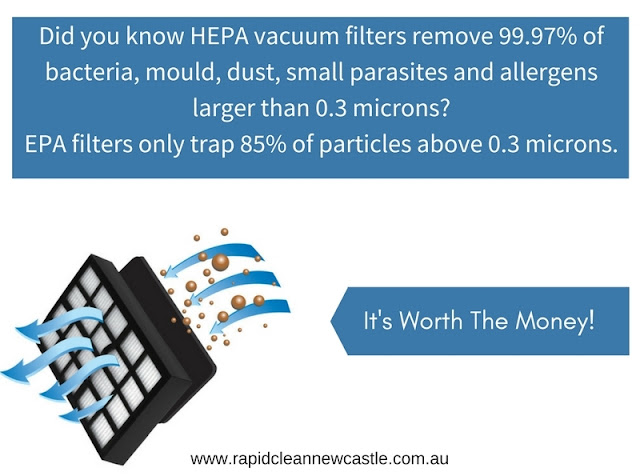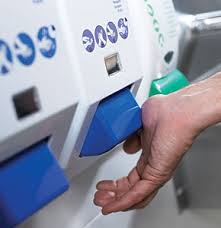Do
I Need A HEPA Filter For My Vacuum Cleaner?
Vacuums with HEPA filtration cost significantly more than
without that filtration. So why pay the premium? What benefits make them a
great investment for owners, staff and customers when buying from Rapid Clean
Newcastle?
What Is A HEPA Filter?
HEPA
is an acronym for "High Efficiency Particulate Air" and has become a
generic term for highly efficient filters. HEPA vacuum filters capture smaller particulates that might
otherwise not be trapped by your vacuum bags. This provides added relief for
allergy sufferers and cleaner air for all. The operator of the vacuum then breathes
highly filtered air exhausted by the vacuum cleaner during the hours of usage. It also benefits
customers working afterwards in these cleaned areas as particles are not air
borne.
HEPA filters trap small
particles that may cause problems for allergy sufferers and others with health
problems. And if you have acute allergies, asthma, COPD or other respiratory
conditions, HEPA filters are an important component of a healthier home, office
or school.
A HEPA filter works by forcing air through a fine mesh that
traps harmful particles. Commercial
vacuums with HEPA filters capture 99.97 per cent of particles from air, such as
dust, animal dander, smoke, mould, and other allergens down to 0.3 microns thus
improving the quality of air. To put 0.3 microns in perspective, it's worth
remembering that a typical human hair is roughly 50–150 microns in diameter, so
a HEPA filter is trapping dust several hundred times thinner. A genuine HEPA
filter is much more hygienic than an ordinary filter because it will stop mould
spores and even some bacteria and viruses.
While it is widely accepted that HEPA
filtration refers to filtering 99.97 per cent of particles down to 0.3 microns,
there are different international standards. The most widely used is the
European Standard EN 1822:2010. This states three filtration classifications:
1.
EPA 10 – EPA 12 : Efficiency Particulate Air Filter – 85% of
particles 0.3 microns and over
2.
HEPA 13 – HEPA 14 : High Efficiency Particulate Air Filter –
99.97% of particles 0.3microns and over.
3.
ULPA 15 – ULPA 17: Ultra Low Penetration Air Filters -
99.999% of particles down to 0.12 microns (Required for industrial strength air
cleaning).
Why Buy a HEPA Filter?
Knowing a bit about how filters work comes in handy
when you're deciding what to buy. A vacuum with proper HEPA filtration will
channel virtually all (over 99 percent) of the dirty airstream through the
filter, if it doesn't do this, it's simply rearranging the dirt. HEPA filters
obstruct the airstream in vacuum cleaners: it takes quite a lot of suction to
pull air past all those convoluted fibres. That's why vacuums with true HEPA
filtration need more powerful motors and ones with low power may not clean
effectively. Air purifiers that use HEPA filtration may have higher power
consumption for the same reason (which means they're more expensive to run for
long periods and noisier than rival technologies). A HEPA filter will also need
cleaning or replacing periodically as well, you might want to check how much
replacement filters cost before you commit yourself.
So if you have a need to manage air quality to
remove bacteria, mould, dust, small parasites and allergens invest in a vacuum
fitted with a HEPA filter.
Rapid Clean Newcastle stocks vacuums with HEPA
filter in both canister and backpack formats manufactured by Nilfisk, Hako and
Pacvac.
Visit Our Website for More www.rapidcleannewcastle.com.au



Comments
Post a Comment